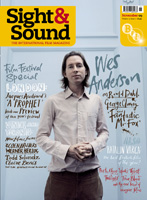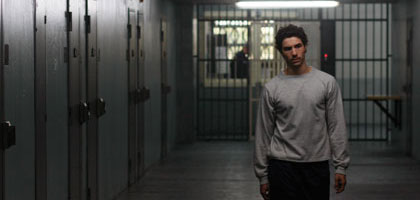Primary navigation


Jacques Audiard talks to Ginette Vincendeau about his follow-up to 'The Beat That My Heart Skipped', prison drama 'A Prophet'
In the media frenzy surrounding the controversial 2009 Cannes festival, Jacques Audiard's Grand Prix for A Prophet (Un prophète) got relatively short shrift, at least on the international scene. In France, though, the film's September release made a big splash, with critics overwhelmingly confirming the Cannes jury's high opinion of the film.
A prison movie, A Prophet charts the rise of inmate Malik (Tahar Rahim) - through a mixture of violence, cunning and old-fashioned education - from illiterate, victimised underdog to powerful gang leader. His fate is linked to Corsican godfather César (Niels Arestrup), who makes him execute a contract, a bloody affair which will haunt Malik in unexpected ways.
With only five features in almost 20 years, Jacques Audiard (the son of celebrated scriptwriter Michel Audiard) has steadily forged a reputation as a strong authorial figure who is not afraid of tackling genre, such as the Resistance film in A Self-made Hero (Un héros très discret, 1996), and the thriller in Read My Lips (Sur mes lèvres, 2001) and The Beat That My Heart Skipped (De battre mon coeur s'est arrêté, 2005). In the past he has worked with high-voltage male stars such as Matthieu Kassovitz, Vincent Cassel and Romain Duris. A Prophet, built on the shoulders of an unknown young actor surrounded by many non-professionals, marks a departure in this respect. But Rahim's charisma and the film's gritty evocation of the prison world make A Prophet every bit as powerful as the earlier films. With it Audiard confirms his unique place in French cinema, while in Rahim a star is born.
How did you develop the script of 'A Prophet'?
There were several things working in parallel, including my desire for realism. Cinema is interesting if it resembles what you see in the street. I understood that I had to change my casting policy and portray people who are rarely represented in French cinema, for instance Arabs and blacks. At the same time, I was following a script by Abdel Raouf Dafri and Nicolas Peufaillit called Le Prophète (The Prophet). But 'the' prophet means Mohammed. There was something heavy and provocative in it, so I changed it to 'a' prophet; there's an irony in it which I don't think gets through.
You used non-professional actors, including real prison inmates.
The cast is very diverse. Tahar Rahim [who plays Malik] is a beginner, though he is outstanding and I never felt his lack of experience. Working with him was remarkable, liberating; he has no past as an actor, no image. There is nothing to fight against - he is just there. Niels Arestrup [César], on the other hand, entirely composed his character. He learned Corsican phonetically and I think that his strictly musical relationship to that language added something to his performance. And then there are many real inmates who brought something extraordinary. I didn't have to explain to them how you enter a courtyard, how you walk along corridors, how you stand alone or in pairs. They knew it all. They even made me change my directing style. Normally you place the camera in relation to the lead actors and organise the background afterwards. I realised this didn't work here - I had to organise the background first and then direct the foreground in relation to it. That was new to me, a real Copernician revolution. I think the realism of the film is there.
Why the fantasy moments in an otherwise realist film?
I visited a few prisons in France and in Switzerland. It was useful, but at one point I realised I had to stop. I didn't want to make a documentary. In the film all is recreated and yet looks real. But I wanted Malik to be more than a criminal. Among other things, adding the ghost of the man he killed gave him interiority very economically. This was interesting both for the psychology of the character and the form of the film. At the same time it brings humour and lightness to such a noir film. It's as if the walls of the cell opened up.
The inmates are Corsicans, Arabs and gypsies, rather than native white French people.
They are all French. Up to a point I think it is insulting to think of a beur [second-generation Arab] as non-French. For me there are conflicts, but they are power relations, not ethnic or racial questions. I could have used Serbs, but the linguistic problems would have been even harder! I simply went for cinematic stereotypes in the same way as American cinema uses Sicilians or Chicanos.
Is there a risk of falling into the stereotype of the Arab as delinquent?
Of course Malik is a delinquent, but he is a good character, he shows great aptitude for learning, he is adaptable, he is brave. Malik is the triumph of intelligence over brute force. I was careful to define him at the outset not as an Arab, but as a vagrant. In the end he does join the Arab group [in prison], and he has a warm relation to his community and culture, but without having a ghetto mentality; he will never be a fanatic.
How do you see your place within contemporary French cinema?
In terms of the film-making process I am an auteur, and I would be very ill at ease in any other system. I would like things to be different, in the sense - and this may be presumptuous - that I would like authors to write for me, to have ideas for me. The French system is not well disposed towards this. A film project in France means a director and a producer, not a scriptwriter and a director.
At home I get annoyed with French cinema, but as soon as I go abroad and see a French film selection, I think, Wow! What variety, what freedom! My place is within this variety.
'A Prophet' is the Sight & Sound Special Screening at the LFF on 24 and 26 October. Jacques Audiard also gives a LFF masterclass on 25 October
Film of the Month: Read My Lips reviewed by Richard Falcon
Film of the Month: The Beat That My Heart Skipped reviewed by Philip Kemp